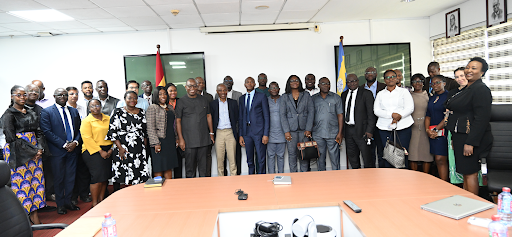Ghana’s Ports praised; GPHA-UKGCC strengthen relations
A team from the United States Department of Agriculture (USDA) has a paid a working visit to the Ghana Ports and Harbours Authority to engage the authority on a number of issues that affect trade.
The UK-Ghana Chamber of Commerce has commended the Ghana Ports and Harbours Authority for putting in place the necessary infrastructure and systems that has improved the business environment in Ghana.
The Managing Director of Unilever Ghana, George Owusu Ansah said this when he led a delegation from the chamber on a working visit to management of the Port Authority.
The visit formed part of the UKGCC’s series of engagements being embarked on with policy makers, stakeholders and business partners towards strengthening business relations.
They were received by the Director General of the Ghana Ports and Harbours Authority, Michael Luguje who maintained that his outfit is open to discussions that lead to workable solutions towards reducing cost of doing business at the ports.
The GPHA Boss intimated that the Port Authority’s charges forms a small component of the entire cost of clearance at the ports.
“You will notice that the total cost of port clearance includes customs charges, shipping line charges, freight forwarding charges, and regulatory bodies. Mostly when we are confronted with port charges being expensive, we try to seek some clarification.”
Furthermore, Michael Luguje said the Authority seeks to promote trade facilitation and is open to discount considerations on a case by case basis for major importers who may be faced with some challenges in clearance.
The General Manager Marketing and Corporate Affairs, Esther Gyebi-Donkor, provided some justification for tariff increments by the Port Authority.
She said like other businesses globally, the Authority suffers from the inflation in price of work-inputs and as such had to adjust the tariffs moderately to avoid running into losses.
A team from the United States Department of Agriculture (USDA) has a paid a working visit to the Ghana Ports and Harbours Authority to engage the authority on a number of issues that affect trade.
The team is in Ghana to meet key institutions to understand Ghana’s approach to the generation of agricultural and related trade statistics to support the implementation of the African Continental Free Trade Area Agreement.
The team was received by the Director General of the Ghana Ports and Harbours Authority, Micheal Luguje.
Issues discussed centred on how data of agricultural products are collected, challenges in collecting data, and how data is streamlined.
The USDA team believes, the information gathered will assist them come up with a report that will provide recommendations to serve the interest in participating countries under the AfCFTA.
“This information will help us with a report which will hopefully provide recommendations and follow up actions that will serve the interest of participating countries. We are going to share our recommendations with the Secretariat and together we will work with them to determine follow up actions that will help implement the trade agreement,” Pauline Simons with the Foreign Agricultural Service, USDA said.
The General Manager, Marketing and Corporate Affairs at GPHA, Esther Gyebi-Donkor took the team through the cargo handling process at the port and how data is captured.
She revealed that due to perishable nature, most of the agricultural produce go through the airport, even though some significant amount goes through Ghana’s ports.
“When the produce is stuffed on the farms, we depend on the declaration of the exporter,” she said.
The Acting General Manager for Corporate Planning, Khalid Nuhu added on to that.
“The exporter will first provide as with the manifest indicating quantities and that is verified at the waterfront. That data is processed and integrated in our total data for import and exports.”
The Director-General of GPHA, Micheal Luguje described some challenges associated with maritime transport within the continent of Africa.
He said one major problem for parties interested in small scale carriage of goods for intra-continental trade is achieving economies of scale for profitability.
Source: Norvanreports


